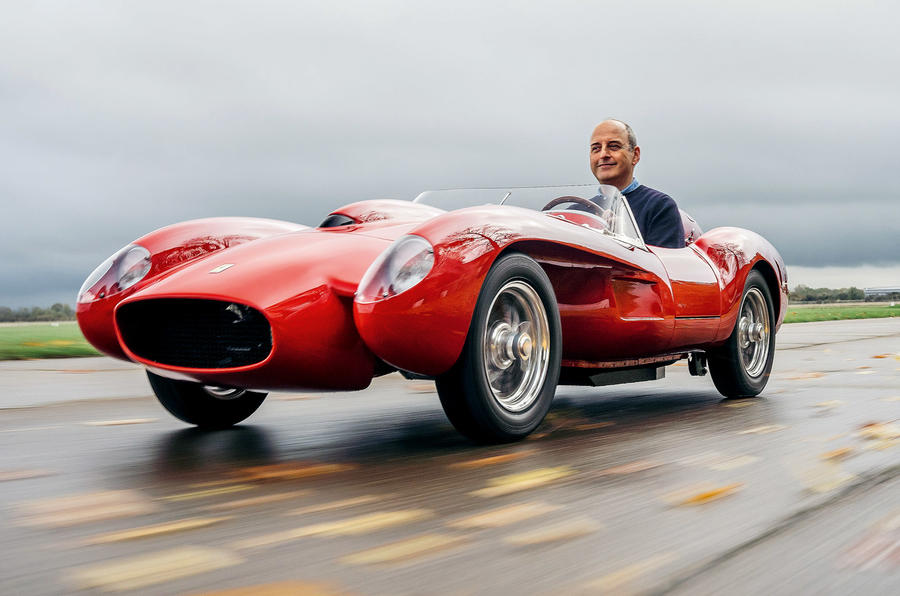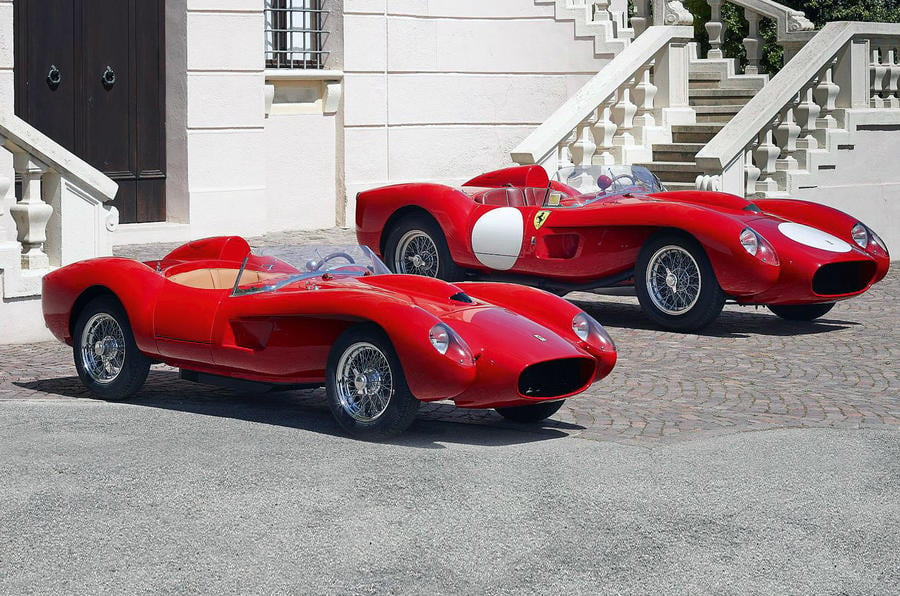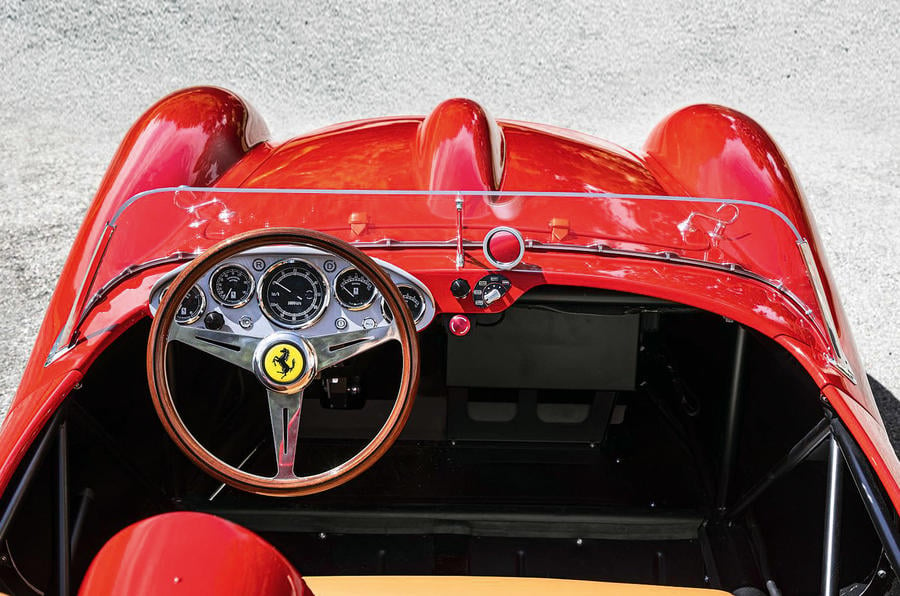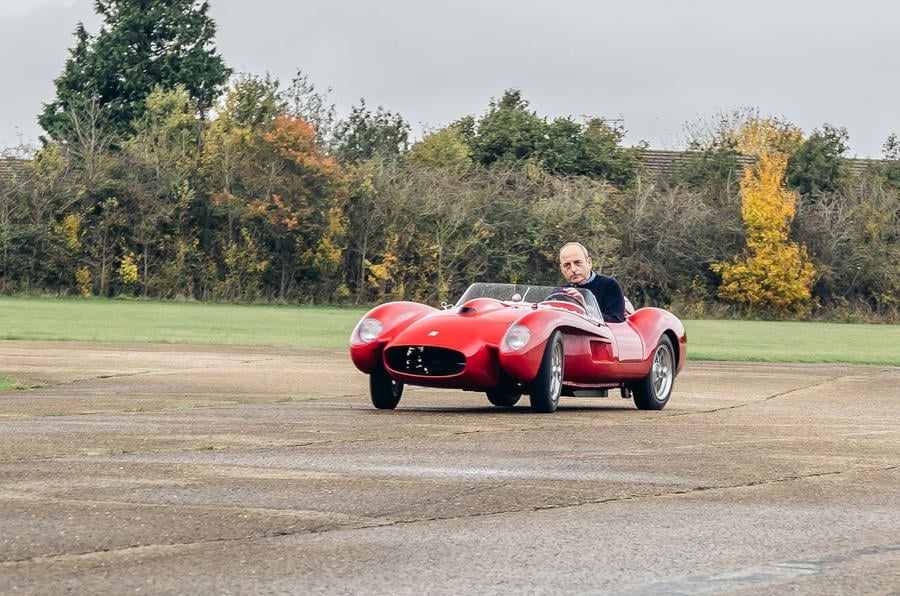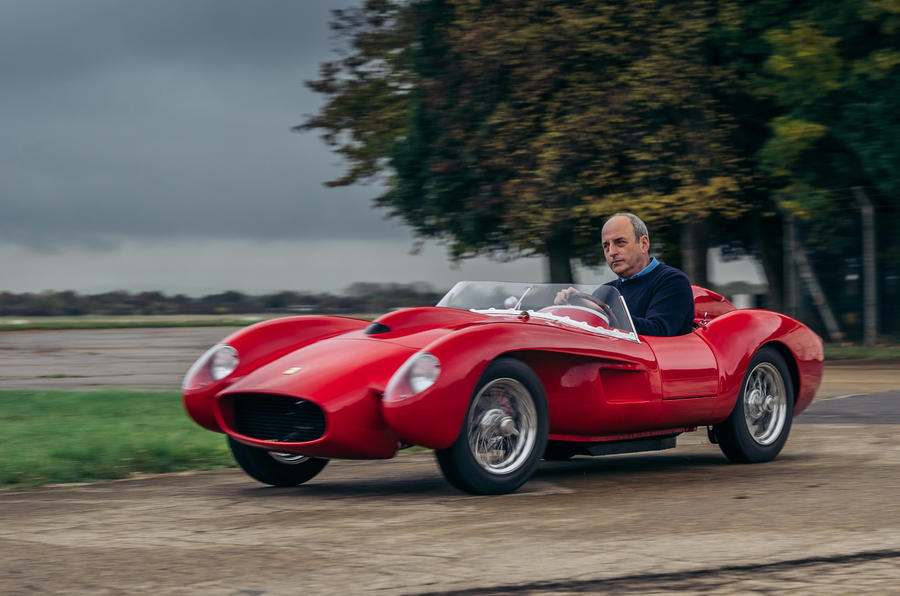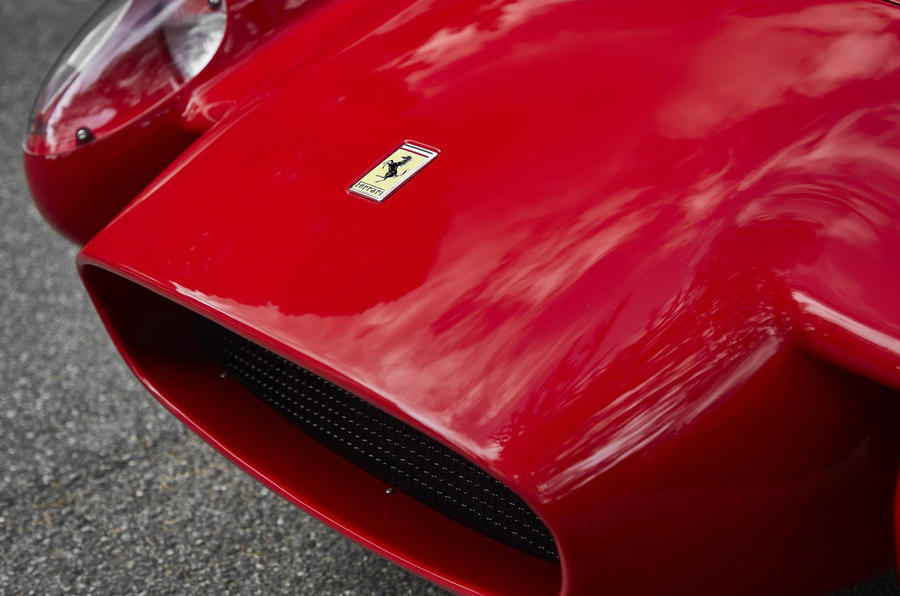Ferrari’s newest model isn’t built by Ferrari. And it’s made in Oxfordshire, not Italy. And it’s an EV. We explain all.
The Porsche Boxster is not, I grant you, perhaps the most obvious way into a story about a three-quarter-scale recreated Ferrari, but bear with me, because if you understand where the Boxster came from, you’ll understand the Ferrari Testa Rossa J too.
Most Boxsters of a certain age came not from Porsche in Stuttgart but Finland, where they were built for Porsche by Valmet. And the Ferrari Testa Rossa J comes from Bicester, where they are built for Ferrari by The Little Car Company. And what is important about this is that if the Porsche is a Porsche, which it very clearly is, then this is a Ferrari.
As with any other Ferrari, Maranello led its design and development. Like any other Ferrari, you can buy one from a Ferrari dealer and like any other Ferrari you can go through the entire atelier process until you end up with a car with a specification that is, in all likelihood, unique to you. Perhaps most telling, particularly for those who still insist this isn’t really a Ferrari, it has a Ferrari chassis plate, too.
All of which confers certain claims to fame on the Ferrari Testa Rossa J. For instance, there is no need to wait years to see what Ferrari’s first full EV might look like, because you’re looking at it right now. With a top speed of less than 100km/h, it is certainly the slowest Ferrari there has ever been. And while British blue bloods such as Jaguar, Aston Martin and Bentley have been happy to plunder their pasts, Ferrari has resisted the urge to make modern versions of its older classics, until now. At €93,000 (AUD$147,000) before shipping, it is in real terms almost certainly the cheapest Ferrari ever sold, until you price it on a bang-for-buck basis, at which point it becomes by a distance the most expensive.
Now you know what it is, let’s look at how it got that way. The first thing to say is that if that price is to make sense at all, what this absolutely is not is some kiddies go-kart onto which a Testa Rossa body has been dropped. Not by a very long chalk.
That body, for instance, is made from beaten and rolled aluminium, its shape determined by the original drawings for a 1957 Testa Rossa, then shrunk to 75 per cent. That paint is the same paint Ferrari uses on its other cars.
Let’s go deeper. Beneath the body is precisely the same spaceframe chassis design of an original Testa Rossa. It has the same double-wishbone front suspension design, even the same geometry, for heaven’s sake. Only the brakes are incorrect: an early Testa Rossa should have drums at each corner, but in the interest of safety, the Testa Rossa J has discs. Bespoke discs, made for this car alone by Brembo.
That’s another thing: the companies that Ferrari and The Little Car Company have worked with read like a Who’s Who of A-list OEMs: to Brembo add Bilstein for their dampers, Eibach for their springs. Borrani provide the option wheel, based on their 1957 original, Nardi the beautiful wood-rimmed steering wheel to precisely the same spec, albeit downsized, as the one it supplied 65 years ago. A toy this may be, but a very serious one it is.
The car is driven by a single, rearmounted electric motor. It is fed by three batteries located under the nose, each the size of a small briefcase and just as portable. If you have three more ready to go in your garage, you can recharge your Testa Rossa J in as much time as it takes to pull the old ones out and slot the new ones in. It’s not quite as easy as changing the batteries in the remote for your telly, but it really isn’t far off.
If you are a burly bloke of a certain age, you’re going to look silly getting in and ridiculous once installed, but this car wasn’t built for you so stop complaining. What is surprising is that the Testa Rossa J will accommodate all 6ft 3in of me, and in reasonable comfort. Not having a socking great V12 where my feet want to be undoubtedly helps. They are all left-hand drive.
You look down and goggle at the gauges, for they are same in design as those of an original TR, right down to their spidery fonts. They have, of course, been repurposed, oil and water temperature now showing battery and motor temperature.
There are other concessions to the modern world. I don’t, for instance, recall seeing a manettino controller on a 1957 Testa Rossa. It has four modes – Novice, Comfort, Sort, Race – offering a range of top speeds from under 20km/h to what Ferrari coyly refers to as ‘over 60kmh’. Actually I think it’s good for around 80km/h, with a range of around 100km before you need to swap your batteries over. And considering the car can only be used on private property, that’s probably both fast and far enough.
It weighs 250kg, at least until I get in and increase the all-up weight of the car by over a third. You turn an authentic-looking knob to the right, press the accelerator pedal (from an F8 Tributo) and you’re rolling.
The track at Bicester Heritage could not be better suited to the car, it being short, tight and, for today, damp. In this environment, the performance is perfectly pleasant. The car rides quite stiffly on its period Pirelli Cinturato CN54s (as supplied new to the Fiat 500 in the ’50s) and there is the odd jolt through the spaceframe, which is authentic to the way cars of this construction behaved back then.
So you whizz around, wondering whether you should feel foolish in finding so much fun in something designed for consumers one quarter your age and concluding you don’t much care. What you actually want to do is skid it about, so I do. There’s not enough power to boot the tailout – which is probably wise – but if you pile into a corner too fast and lift off, weight transference will do the job for you nicely. You can then power on, exit on opposite lock and try to look serious in front of the Little Car Company staff watching on, the gimlet-eyed critic, coolly assessinghis latest quarry, not some grinning idiot old enough to know better pretending he’s Mike Hawthorn.
This is a rich person’s plaything, a Christmas or birthday present for an unimaginably privileged teenager. It has no relevance to anything. But that doesn’t mean you can’t drool over its appearance, admire its build quality or drop your jaw at the efforts gone to in order to confer legitimacyon it. There will be only 299 Testa Rossa Js, which makes them rarer than LaFerraris, over half are already sold and if it sells out ergo it will be worth the asking price.
But I’m not very interested in that. What I like is that The Little Car Company had the idea, that Ferrari went for it and that together they created something that, regardless of its purpose, is a thing of immense quality and of which all involved will be rightly proud.
About The Little Car Company
The Little Car Company has come an extraordinarily long way since its inception in 2019 and has not let a global pandemic get in the way. The Testa Rossa J is the third downsized electric ‘classic’ car it has produced, the first and second being the Baby Bugatti II (inspired by Ettore Bugatti’s own Type 52 Bugatti, itself a child’s version of his Type 35 Grand Prix Car) and the Aston Martin DB5 Junior, which probably needs no further explanation.
The key to its success would seem to be that each car is created not just with the full approval of the original manufacturer, but in complete consultation with their management and engineers and often featuring original parts such as badging. However, its next project flips the pint-sized principle on its head and will instead be a full-sized potentially road-going version of the iconic Tamiya Wild One radio-controlled model car, the finished version of which we will see next year.
Beyond that? Well, I happened to see the full-sized version of what they’re planning next when I went to drive the Testa Rossa J. I am naturally sworn to secrecy, but I think I can say without much fear of contradiction that it will be worth the wait.
Andrew Frankel




